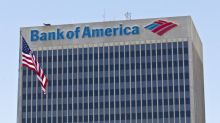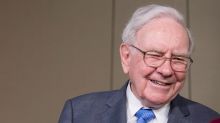BAC Jan 2025 20.000 put
OPR - OPR Delayed price. Currency in USD
Add to watchlist
As of 12:36PM EDT. Market open.
| Previous close | 0.0900 |
| Open | 0.0900 |
| Bid | 0.0500 |
| Ask | 0.1000 |
| Strike | 20.00 |
| Expiry date | 2025-01-17 |
| Day's range | 0.0900 - 0.0900 |
| Contract range | N/A |
| Volume | |
| Open interest | 21.14k |
 Zacks
ZacksBank of America (BAC) Gains As Market Dips: What You Should Know
Bank of America (BAC) closed the most recent trading day at $39.76, moving +0.28% from the previous trading session.
 Zacks
ZacksBofA (BAC) to Take Advantage of the European IPO Market Revival
BofA (BAC) looks to build out its equity capital markets franchise in Europe, as the continent witnesses an IPO revival.
 Investor's Business Daily
Investor's Business DailyWarren Buffett Counts On This Stock The Most As Apple Sours
Apple is the largest position in Warren Buffett's Berkshire Hathaway. But it's not the stock the famed investor is making the most money on.